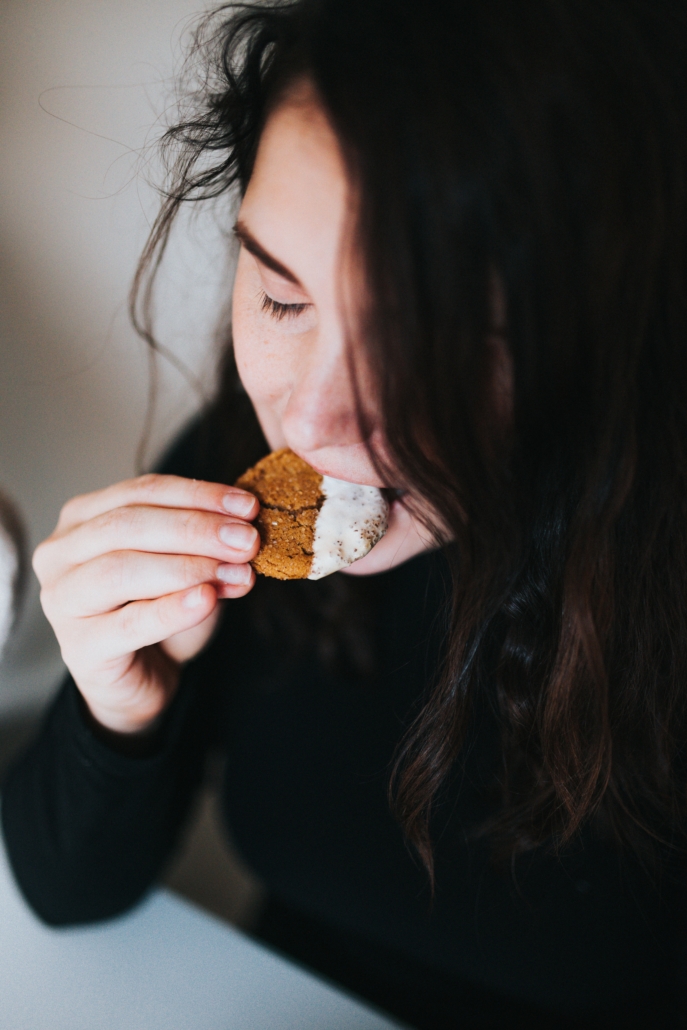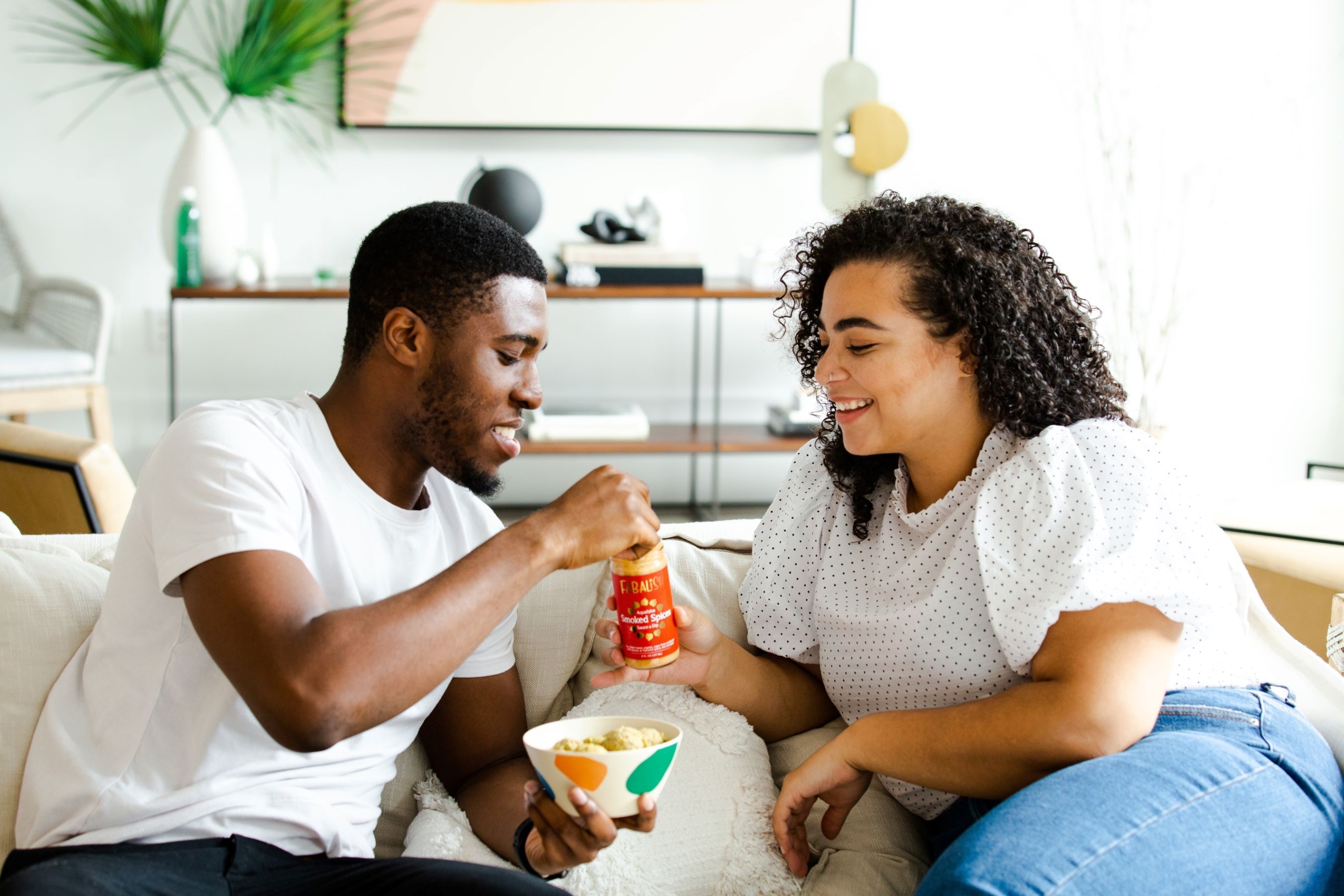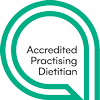Cope with your emotions with kindness
This is the seventh post in a 10-part series looking at the principles of Intuitive Eating. The previous post in this series was on feel your fullness.
Diet culture likes to paint emotional eating as something to be avoided and controlled. The 7th principle of Intuitive Eating – Cope with your emotions with kindness – offers a more compassionate and nuanced perspective. It recognises that food and emotions are inextricably linked and that we all eat for emotional reasons, at least to some extent. It accepts that using food for comfort is an entirely valid and human way of caring for ourselves – especially if we don’t have other tools available to us to make difficult feelings more bearable. And it also recognises that while food may help us feel better briefly, identifying what we are feeling, what our needs are and how to fulfil those needs is likely more helpful for us long term.
Here are 5 ways Intuitive Eating offers a more compassionate and nuanced perspective than the one offered by diet culture.
Food and emotions are inextricably linked
From the time we are babies, we learn that food is love and a fundamental source of warmth and comfort. Food plays an important role in most (if not all) cultures and religions. We celebrate important holidays with food. We also celebrate significant life events like birthdays and weddings and other events with food. In other words, we all eat for emotional reasons – at least sometimes.
Using food for comfort is entirely valid
Painting emotional eating as something negative, to be avoided and controlled pathologizes using food for comfort, when this is an entirely valid and human way of caring for ourselves. This is especially true when we don’t have other tools available to us and food is the only thing we can turn to during times that are very difficult or particularly stressful. For some people, food is the only tool they have available that makes unbearable feelings more bearable.
Emotional hunger is often mistaken for biological hunger
Sometimes we can mistake emotional hunger for biological hunger. People who have a lot of rigid food rules, are dieting or ‘eating healthy’ and restricting what they eat during the day, often find themselves feeling out of control around foods like ice cream, cake, chocolate and chips in the evening. (I’m not suggesting these foods are “bad”. They are typically the kinds of foods people seek out when they are experiencing primal hunger because these foods deliver energy in the form of sugar and fat). When this happens, many people blame themselves, thinking this is down to a lack of willpower, but when we deprive ourselves of food, our biological drive to eat kicks in and it can feel like we’re “eating emotionally”. Also, dieting and restricting foods can sometimes drive the emotions: chronic food deprivation will make anyone cranky, sad, and anxious.
Emotional hunger can be a way to nurture yourself
Emotional eating can be a constructive, healthy way to nurture yourself. This includes choosing foods that truly satisfy you, foods you truly enjoy eating as well as choosing things like chicken soup or vegemite on toast when you’re sick, a meal from your childhood that brings back happy memories or hot cocoa when the weather outside is dreary.
Emotions are information
Eating for emotional reasons can be a sign that something in your life is not quite right. Perhaps you are overwhelmed with responsibilities. Maybe you are not getting enough time to properly unwind and relax. Maybe you are grieving someone or something. Whatever the reason, it can be a gift in the sense that it can be a clue that some of your need(s) are not getting met and that can be helpful to explore.
The emotional eating continuum
Emotional eating isn’t the same for everyone and it can take on different forms. We can imagine emotional eating as existing on a continuum moving from sensory gratification to eating for comfort to eating for distraction through to eating for sedation and finally to the other end of the spectrum to eating as a form of punishment.
Sensory gratification is essentially eating for enjoyment and pleasure. This is a very normal and encouraged part of Intuitive Eating.
Eating foods for comfort can be part of a healthy relationship with food, if you do it while staying present, and without guilt.
Many people use food as a distraction from feelings they choose not to experience. Using food in this way can be a problem, because it prevents you from identifying and therefore meeting an underlying physical or emotional need.
A more serious form of emotional eating is using it as sedation, to numb yourself. This keeps you from feeling your feelings for an extended length of time, and it also makes it impossible to notice your hunger or satiety cues.
And at the other end of the spectrum is punishment. This is when eating becomes destructive and the feelings of guilt and self-blame may become so intense, that you then start using food to punish yourself. You may eat in an angry and aggressive way, like you’re trying to beat yourself up and make yourself feel even worse about your behaviours.
This is not to shame anyone who may use food in these ways. If you were not taught how to cope with uncomfortable feelings any other way, then it’s understandable if food has become your go-to for escaping. And it is possible to learn other ways to cope with these emotions and get out of the emotional eating pattern.
What triggers emotional eating?
The key to helping yourself is to identify the triggers for your emotional eating. Here are a few you might recognise:
- Boredom: eating to fill in time or when you get bored doing a certain task.
- Soothing: You eat to feel better after a tough day. If your parents gave you food to make you feel better, you’re likely to do the same as an adult, often subconsciously. For example, if as a child you were offered food when you fell over and grazed your knee, you might also eat to feel better as an adult.
- Love: Showing yourself or others love through food.
- Reward: Eating to reward yourself might look like “I worked hard today so I deserve dessert”. This might happen if for example, as a child you were offered food as a reward for doing well at school.
- Excitement: If life feels dull, you might be using food to add some excitement in your life.
- Procrastination: You might eat to put off doing something you don’t really want to do.
- Frustration and anger: Eating for these reasons might mean you seek out hard, crunchy foods.
- Wanting to feel connected: The desire for personal connection can affect what and how we eat in social settings.
- Depression: Many people turn to food for comfort or soothing when experiencing mild depression.
- Stress: when we are stressed, we might soothe our anxiety by eating.
Questions to ask yourself
No matter where you fall on this continuum, and no matter what your emotional eating triggers are, start by asking yourself these 4 key questions:
- “Could I be biologically hungry?” If so, then Honour your hunger and eat.
- If no, ask yourself “what am I feeling?”
- Once you have identified the emotion you are feeling, ask yourself the question “What do I need?” For example, if you identified that you are feeling lonely, you might need some social connection. If you realised you are bored, you might need some entertainment or other stimulation.
- Then ask “How can I get that need met in a compassionate and effective way?”. In the first example above, you might meet your need for social connection by calling a friend or family member to talk or arrange to meet for coffee or a meal.
The first question is important because many people attribute any “overeating” to emotions or stress. However biological hunger can lead to feeling out-of-control around food too, so it’s important to differentiate between what might actually be biological hunger and what is emotional hunger. I put “overeating” in parentheses because diet culture likes to define how much is OK to eat and so many people unconsciously interpret eating even a bit more than this as “overeating” when in reality it might be eating to meet your biological need for food.
If you’ve identified that you aren’t biologically hungry, the next question to ask is “what am I feeling?”. By allowing your feelings to come up, you reduce your need to push them down with food. It isn’t always easy to identify what you are feeling, especially if you grew up seeing adults sweep emotions and hard feelings “under the carpet” and never learnt how to get in touch with your feelings. If you have trouble identifying your feelings or coping with them, you may benefit from talking to a psychotherapist.
Emotions are information, and when we numb out or distract ourselves with food, we aren’t really listening to that information, and that can prevent us from meeting an underlying physical or emotional need. Exploring when and how we use food emotionally from a place of self-compassion and curiosity allows us to find other ways of meeting our needs. So, next time you feel upset, can you try to identify what you are feeling? Sadness? Anger? Boredom? Disappointment? Rejection? That’s information you can use to start finding longer-lasting solutions.
This process can be especially helpful if food has become the primary or only way of coping with your emotions. This doesn’t mean you must stop turning to food for comfort—not at all. It’s about adding more coping skills so you feel better equipped to deal with life.
Meeting your needs compassionately, in ways other than food
Finding and using other ways of coping with your emotions may feel really uncomfortable at first. It can be helpful to understand why it feels uncomfortable, by listing all the ways using food to cope with your feelings has helped you (e.g. it soothes me, it stops me from feeling bored etc.). And then listing all the ways it is not helpful (e.g. I feel enormous guilt afterwards, I feel uncomfortably full).
Make a list of how you can meet your needs in your phone notes or on a piece of paper and stick it somewhere you can easily refer to it when you need. You can think of this as adding tools to your tool box in addition to food for coping with certain emotions. The bigger your coping toolbox becomes, the better able you will be to cope with your emotions in ways that are helpful for you. For example, if you are feeling lonely, calling a friend or family member and talking or arranging to meet might help. If you are feeling stressed or anxious you might find going for a walk in nature or doing some deep breathing helps. If you are feeling bored, you might consider something entertaining to do or consider changing the task you are currently doing.
Short and sweet
Emotional eating isn’t inherently bad. Food and emotions are inextricably linked and we all eat emotionally, at least to some extent. Using food for comfort is also an entirely valid and human way of caring for ourselves. And while eating for emotional reasons might offer some initial comfort, it might not be giving us what we actually need in that moment. Ultimately, it’s more helpful to consider eating emotionally as an important clue that your body is giving you about your unmet needs. What are you really feeling? And therefore, what do you really need and how can you meet that need in other ways (in addition to food)?
Ready to take the next step? Contact me and request a complimentary call to find out more about Intuitive Eating and how it can help you truly nourish yourself – body, mind and soul.






